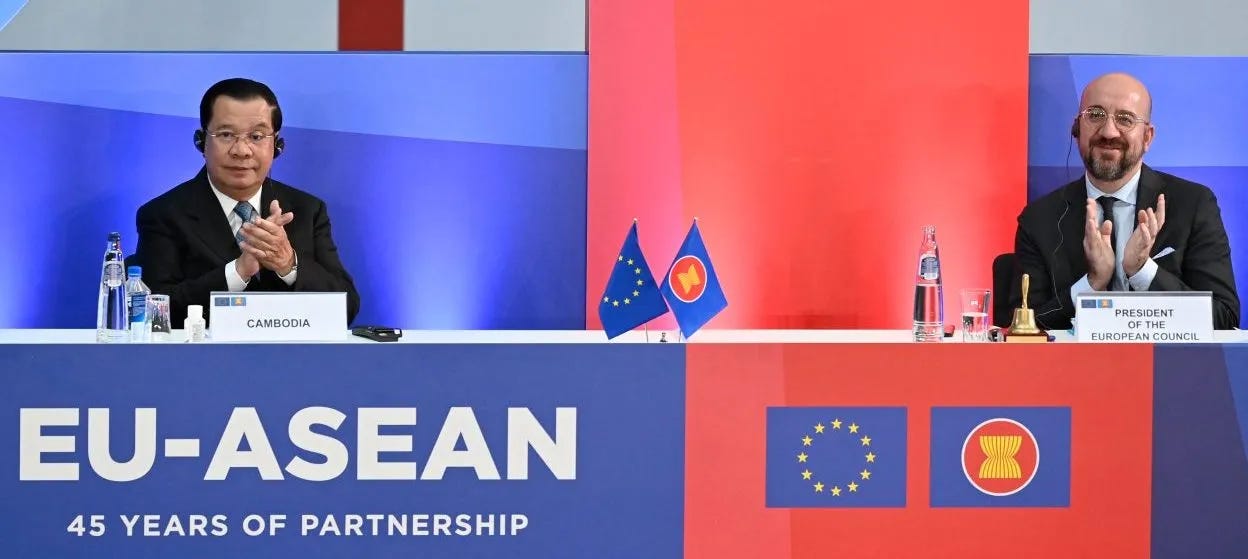Power Trivia
ASEAN-EU Partnership Remains Vital to Sustain Multilateralism in A Shifting Global Order,
UPDATES: However, events today have shown that multilateralism might be eroding as states pursue nationalism and protectionism, especially in crisis situations – including within both regions. This is exemplified by instances such as vaccine nationalism during the COVID-19 pandemic, critical mineral and food protectionism in Southeast Asia and the EU, and the rejection of the UN Global Compact for Migration by nine EU members.
(Photo by John Thys / AFP)
ASEAN-EU Partnership Remains Vital to Sustain Multilateralism in A Shifting Global Order
By Fulcrum
ASEAN and the EU ministers are slated to convene in Brussels on 2 February 2024 for the 24th ASEAN-EU Ministerial Meeting. This meeting carries heightened significance amid unprecedented geostrategic challenges and complex conflict unseen in the past. Observers worldwide are anticipating how these two prominent regional organisations can collaborate to address global and regional crises while upholding the multilateral global order.
Chaired by EU High Representative Josep Borrell and the Philippines Secretary of Foreign Affairs Enrique Manalo (serving as Country Coordinator for ASEAN-EU Dialogue Relations), the meeting is expected to further enhance the ASEAN-EU Strategic Partnership and would allow both regions to exchange views on regional and international issues, including recent developments in the Middle East.
At the ASEAN-EU Commemorative Summit held in December 2022 and over the past 47 years of relations, both regions have consistently reaffirmed the importance of strengthening the rules-based multilateral system which they believe has been key in the promotion of peace and stability post-World War II. Shared values and principles such as the rules-based international order, effective and sustainable multilateralism, as well as free and fair trade remain the foundation of the relationship and key premise for the ASEAN-EU Strategic Partnership.
However, events today have shown that multilateralism might be eroding as states pursue nationalism and protectionism, especially in crisis situations – including within both regions. This is exemplified by instances such as vaccine nationalism during the COVID-19 pandemic, critical mineral and food protectionism in Southeast Asia and the EU, and the rejection of the UN Global Compact for Migration by nine EU members.
Multilateralism is also being threatened within the two regional organisations as they struggle to maintain their unity when members are split over divisive issues such as the war in Gaza. Within ASEAN, forging a common position for a joint statement on the conflict has not been an easy task due to the divergent positions among member states. The gap between the Muslim-majority countries and those which recognise or have stronger ties with Israel is a particularly tricky divide. Similarly, the EU member states are at odds with each other, exposing a deep division within the organisation on policy towards Israel and Palestine. Even on the issue of demanding a ceasefire, EU member states had issues reaching a consensus on the wording of the resolution. The Joint Ministerial Statement expected after the meeting is likely to encounter tough negotiation on wording and content.
The rise of exclusive minilateral groupings in the Indo-Pacific, such as the Quadrilateral Security Dialogue (QUAD), the trilateral security partnership between Australia, the UK and the US (AUKUS), and other trilaterals reflects a global trend for states to hedge their bets on diverse groupings in pursuit of national interest, further eroding multilateralism.
Considering these challenges, ASEAN and the EU will need to intensify efforts in preserving the hard-fought multilateral order. The ASEAN Outlook on the Indo-Pacific and the EU Strategy for Cooperation in the Indo-Pacific will help to guide these efforts and foster strategic alignment within their respective regional architectures. The complementarities between both documents afford both organisations to work closely together in addressing common challenges, building trust, setting standards, and promoting good regulatory practices in Southeast Asia. The upcoming Third EU Indo-Pacific Ministerial Forum in Brussels — where most ASEAN foreign ministers are expected — will be another opportunity to help shape a collective vision for both regions.
Read more here.



